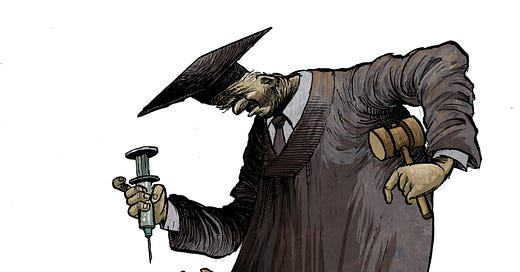Oklahoma executed a convicted murderer last week. Anthony Sanchez was killed for a 1996 murder though he was not arrested until 2006 based on DNA evidence.
Earlier this summer, Glynn Simmons was freed from Oklahoma’s prison after 48 years. He, too, had been assessed the death penalty, but that was changed to a life sentence following a 1977 U.S. Supreme Court decision. In his case, prosecutors failed to tell the defense that another suspect had also been picked out of a lineup by the witness who had ID’d him.
At the time of both murders, and even up to the time of Sanchez’s conviction, I would have accepted those death sentences as just punishment. I have changed my mind.
Gradually, over the past dozen years or so, I have decided that systematic, deliberated executions are beneath the best of what we can be as humans. The mechanized, assembly-line process employed by governments is just organized murder.
Yes, many of the crimes are heinous. I have often said that people committing certain vicious acts “forfeit their place in the human race.” It has been a rhyming mantra.
Yes, we are making sure that one killer does not kill again. But a sentence of life without parole would accomplish the same goal. Plus, our steady news stream of senseless murders proves conclusively that the death penalty deters no one, no time, no how.
What it does is align us with some very unsavory people.
Amnesty International cited 883 known executions in 2022, “which does not include the thousands believed to have been carried out in China.” Records from North Korea and Vietnam are also kept secret.
Many of those unreported executions [and many in the next paragraph] were for purely political purposes, the kinds of purging of political differences exemplified by, “Hang Mike Pence.”
Looking up the statistics, I kept running into varieties of the same headline: “Three countries are responsible for 90% of the executions.” Most of those known executions occurred in Iran, 576; Saudi Arabia, 196 [81 in a single day], and Egypt, 24.
Those were the top three. Left out of the headline, and often the story, was the United States’ solid hold on fourth place, 18.
I guess those media outlets did not want us to be associated with some of the most vicious countries in the world. I don’t, either.
To say it brings out the worst in us takes me back to my days in Huntsville, TX – Prison City, USA. The death penalty moratorium was in effect during my abbreviated tenure as managing editor of The Huntsville Item.
A few years later, the executions resumed. In 1983, I wrote for The Texas Observer:
“It’s an ugly business, death – and state officials don’t reveal who does the ugliest work. It’s fitting that the two death watches here have been ugly scenes dominated by blood-thirsty mobs chanting for death, threatening those who disagree with them and, in toto, making a mockery of their own claims about the sanctity of human life.”
At that time, I observed that the shift from Old Sparky to death by injection meant that the state could take its high-tech Middle Ages circus back to the county where the crime was committed. That way Huntsville could share the ignominy of atrocious behavior with other cities. I pointed out that many of the worst participants in the crowd were drunk college boys, who, like the murderers, were from out of town.
Most of us don’t act like that, of course. Still, we can view such unseemliness as the boil emerging from an infection deep within society as a whole.
Sanchez went to his death proclaiming his innocence. Whether he or Simmons were truly innocent or guilty is beyond my ken. Juries convicted them both, one with now-suspect evidence.
Other Death Row residents across the country have been convincingly exonerated. The likelihood is high that innocent men have been killed by order of our governments – and, ultimately, we the people who comprise them.
Innocent people get murdered every day. Aligning our response with the cold cruelty of their killers reduces our humanity to their level.







I've always believed that one murder doesn't justify another, but the most convincing argument against the death penalty versus life without parole is that the latter allows us to correct our mistake in the case of a wrongful conviction.